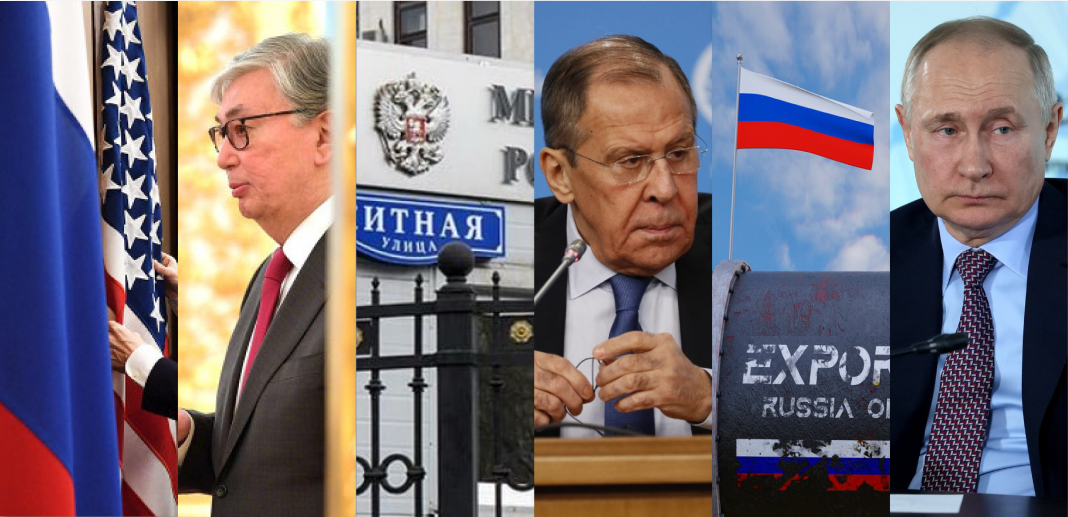This report presents the key events that had an important impact on Russia’s political, economic and social processes. During November 28 – December 4, the following topics were the most relevant for Russia:
Russia’s denial on further negotiations with USA in respect of New START agreement
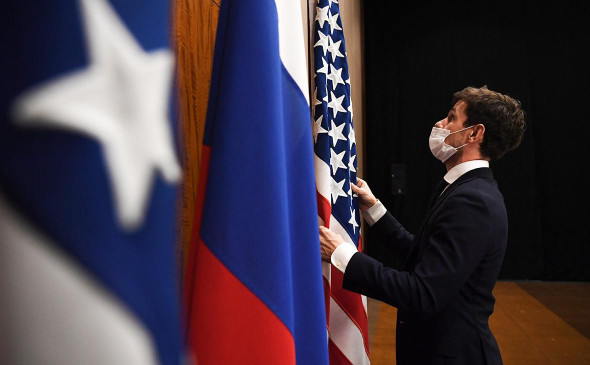
On Tuesday, November 29, a meeting of the Russia-US Commission on measures to further reduce and limit strategic offensive arms (New START) was to begin in Cairo. However, the day before the scheduled start of the meeting, the Russian side announced that the event was postponed to a later date. At the same time, a few weeks before the scheduled appointment, several sources reported that the main topic of negotiations should be the resumption of inspections of objects with nuclear weapons under the New START. However, as of December 4, a new meeting date has yet to be set. At the same time, both sides exchanged statements in which they hinted that the negotiation process was still underway.
Timeline:
- On Monday, November 28, the Russian Foreign Ministry announced that the meeting of the Russian-US commission on New START, scheduled in Cairo from November 29 to December 6, was postponed to a later date.
- The US State Department stated that the American side is ready to hold a commission meeting on New START with Russia “at any shortest possible time.”
- The Russian side has told the US that it will propose new dates for the postponed START commission meeting.
- On November 29, Russian Foreign Ministry spokesman Sergei Ryabkov made several statements regarding further plans for negotiations with the United States under New START:
- Ryabkov stated that the decision to postpone consultations on New START was taken at the political level – the parties could not agree on a program of talks.
- Ryabkov will propose new dates for consultations on New START but noted that they would only be held at the end of the year – there will be a pause before the new meeting.
- Ryabkov noted that what is happening in Ukraine and around it does not affect Russia’s approaches in the field of nuclear deterrence.
- On December 3, US State Department spokesman Ned Price said that the US was ready to engage with Russia within the framework of the New START Implementation Commission, was disappointed by the cancellation of its meeting, and denied the accompanying accusations against him.
Conclusions and outlooks:
The last time the Russia-US Commission met was in October 2021. After the beginning of the invasion of the Russian occupation troops into Ukraine, its work was suspended.
It is important to note that the treaty on measures to reduce further and limit strategic offensive arms (START) allows US inspectors to monitor Russian nuclear forces and facilities. At the same time, back in September, the Russian and US Foreign Ministries exchanged notifications on the number of strategic offensive weapons under New START. As a result of the exchange, Russians put forward several claims, the dissatisfaction of which served as the postponement of the meeting.
The essence of the issue is that the number of nuclear facilities declared by the United States does not consider 41 B-52H heavy bombers and nuclear warheads counted behind them, 56 Trident-II SLBM launchers and 4 ICBM silo launchers. According to the United States, these facilities were converted into “non-combat” ones, and the ICBM silo launchers became training silos. However, the Russian Foreign Ministry says that Moscow cannot confirm their reduction to a state unsuitable for the use of nuclear weapons – and objects to the arbitrary reclassification of installations intended for training into the category of “training mines” not provided for by START-3.
At the same time, the United States declares its readiness to postpone the meeting as soon as possible.
In this case, it is worth assuming that the meeting between the US and Russian delegations may take place as early as January 2023 but will be part of a more global negotiation process, following which several agreements will be signed in the plane of strategic stability. Most likely, this process may also affect the Ukrainian issue, but more is needed to lead to its complete resolution.
At the same time, the factor of the absence of agreements on START-3 – that is, on control of nuclear weapons, is an additional element of informational pressure on Europe. Apparently, in this way, Russia is trying to soften the position of the West and make it more pragmatic.
Launch of a unified register of information about foreign agents.
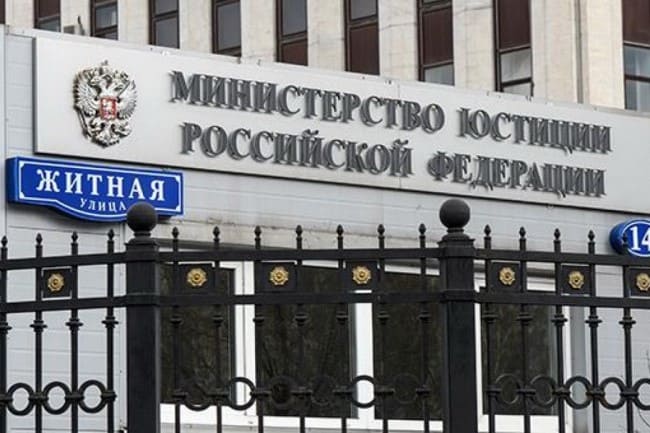
On Thursday, December 1, a new law, “On Control over the Activities of Persons Under Foreign Influence,” came into force in Russia. The State Duma adopted the law at the end of June, but since then, more than 50 other laws have been introduced, including the criminal code and several stricter amendments. Also, the government of the Russian Federation added more stringent rules for their application. According to the new law, everyone who has already been recognized as a “foreign agent” will be united into a single register from December 1, and unique individuals and organizations will be added there. At the same time, the Ministry of Justice will now publish not only the name but also the personal data of such people – including the date of birth, TIN and SNILS (insurance number of an individual personal account).
Moreover, a new register of persons affiliated with “foreign agents” should operate – employees of CSOs and media-foreign agents, heads, and founders of such organizations. Including the former. The new registers will be replenished by the former division of the Ministry of Justice: back in the spring, the authorities created a special department for this – “to protect national interests from external influence.” Vladimir Putin personally approves its head.
Conclusions and outlooks:
The Russian authorities are significantly intensifying their fight against the influence of foreign states on internal processes in Russia. At the same time, any democratic norms actively supported by the West no longer have any weight and impact on the country’s public opinion and political decisions.
The reaction of society to the full-scale invasion of the Russian occupation forces in Ukraine, as well as to partial mobilization, demonstrated that the average Russian is more likely to share totalitarian norms than the ideas of “freedom” inspired by the West.
Launching a unified register of information about foreign agents demonstrates Putin’s overall strategy: a complete turn towards Central Asia and China. This part of the world will not condemn such actions but only support them, calling them legitimate.
It is also important to note another factor influencing the intensification of the fight against foreign agents. Recently, several sources have reported a possible acceleration of the transfer of power in Russia, which may take place not in 2024 but already in 2023. Thus, it can be assumed that the authorities are trying to level out any possible external influence on the process of a controlled transfer of power as much as possible “receiver.”
It is worth paying attention to another high-profile event, which may be partially related to this topic. On December 1, the Magomedov brothers’ court verdict was announced, according to which Ziyavudin Magomedov (the owner of the Summa group of companies) was sentenced to 19 years in a strict regime colony for creating a criminal community and embezzlement of budget funds, and his brother Magomed (member of the Federation Council of the Federal Assembly of the Russian Federation in 2002 -2009) – by the age of 18. The Magomedov brothers are considered close to Arkady Dvorkovich. That is, to Dmitry Medvedev, who has recently begun actively gathering around himself the most radical part of Russian society, demonstrating further political ambitions. Several Russian Russian experts dubbed this event a conditional “hello” for Medvedev from Putin. The abrupt conclusion of the case, and even with such a severe sentence, may also be evidence of preparations for serious political turbulence within Russia as early as next year.
Meeting between Vladimir Putin and young scientists.
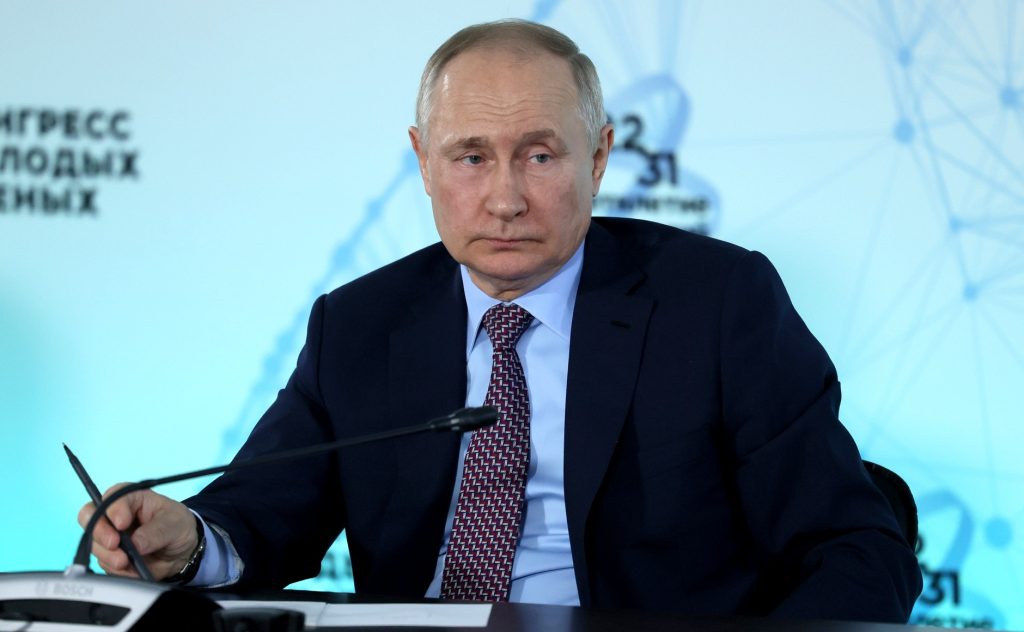
On Thursday, December 1, in Sochi’s Sirius Science and Art Park, Vladimir Putin met with participants in the Second Congress of Young Scientists and the program to develop a managerial talent pool in science, technology and higher education. The theme of the congress was the global challenges facing science and solutions for agriculture, medicine and ecology.
Key theses of Putin’s speech:
- “We need to move to a new level of technological development quickly.”
- “Much has been lost in the 1990s when everything was falling apart, and science was falling apart, problems arose in education. Nevertheless, the fundamentals were so powerful that it was impossible to ruin everything.”
- “It is necessary to set all institutions of state power, all structures, all public organizations, all citizens to convince the whole society that sovereignty, the future of technological development, technological sovereignty, industrial, even value sovereignty can be founded and can take place. Only based on fundamental and applied science, only on a scientific basis.”
- “Another urgent task is, of course, the integration of the new territories of Russia into the scientific environment, into the educational environment. It is clear that here, first of all, the people who came and voted need to, as they say, grow into Russian reality. And Russia needs, first of all, to gain a solid foothold there. Still, this consolidation means not only resolving issues of a military-political nature – it means working in these territories and with people so that people feel the advantage of joining Russia.”
- “Unfortunately, our dependence on foreign instrument base is very high, up to 90 per cent in some areas. And in today’s conditions, this is especially acutely felt, although – I talk about this all the time, and I think you will also agree with me – it is clear that it is impossible to work without an instrument base. But it is also clear that it was necessary to develop our instrument base intensively. And so, for oil and gas dollars, you can buy anything, from nails to diamonds, but you will never produce anything of your own.”
- “People need to live normally, so they don’t have problems because they came and voted to join the Russian Federation”.
- “If you look at young girls: how does Fedorova, who lives in the Lugansk Republic, differ from the same Fedorova somewhere in Novosibirsk, St. Petersburg or Moscow? Nothing. These are our people.”
- “… Since I don’t remember exactly, all my relations with Japan go through judo, but in Japan, in my opinion, there are several thousand, almost three thousand such stations [geological], and we have somewhere 350 or near.”
Conclusions and outlooks:
The creation and holding of such a congress became a response to strengthening Western sanctions against Russia. Because the congress was created a year ago – a few months before the start of a full-scale invasion of the Russian occupation forces into Ukraine, it can be assumed that even then, the Russian authorities were actively preparing for a conditional “import substitution” in the field of science.
The most important factor of this event is the focus on the younger generation. During his last year’s speech at Sirius, Putin focused on the fact that in the early 2000s in Russia, less than 25% of scientists were under 40 years old. And today this figure is almost 50%.
Also, one of the main accents in Putin’s communication with young scientists was made on the occupied territories of Ukraine, which, according to Putin, the Russian authorities are trying in every possible way to integrate into Russia in an accelerated format. Previously, there were many statements about the need to implement infrastructure projects in the territories of the so-called “LPR” and the temporarily occupied Zaporizhzhia and Kherson regions. Moreover, the very mention of these territories becomes, in fact, mandatory in all of Putin’s public speeches. For example, during the celebration of Unity Day in Russia, Putin repeatedly raised the issue of the need to restore and develop cultural heritage sites in these territories.
At the same time, it is essential to note that in scientific research, Putin is trying to focus precisely on bioengineering. Moreover, while talking to young scientists, Putin promised to discuss with the government the issue of allowing experimental gene therapy drugs for patients with diseases that do not have alternative treatments. Finally, it is worth noting that Putin’s youngest daughter, Katerina Tikhonova, is actively involved in this area.
Earlier, Ascolta wrote that Tikhonova, together with the Kovalchuk brothers, oversees the development of anti-ageing medicine, which Putin called “one of the priorities of the Russian Federation.” Also, this group controls the production and sale of the Sputnik V drug.
In this case, it can be assumed that the development of infrastructure for young scientists at the Sirius base is supervised by the same group, which explains Putin’s active involvement in these processes.
Visit of the President of Kazakhstan Kassym-Jomart Tokayev to Moscow.
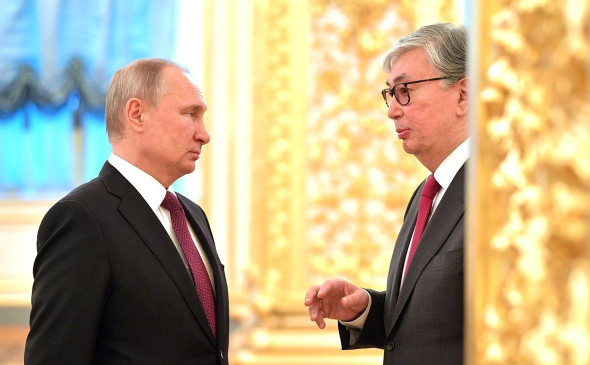
On November 29, President of Kazakhstan Kassym-Jomart Tokayev paid an official visit to Moscow, where he took part in several events and met with Vladimir Putin. From the Kremlin, together with Putin, Tokayev took part via videoconference in the XVIII Forum of Interregional Cooperation between Russia and Kazakhstan, which was held in Orenburg. Tokayev also held direct talks with Putin, during which a joint Declaration was signed on the 30th anniversary of establishing diplomatic relations. In addition, the President of Kazakhstan managed to participate in the flower-laying ceremony at the Eternal Flame near the Kremlin wall and also held a meeting with Russian Prime Minister Mikhail Mishustin. After a visit to Russia, Tokayev will travel to France, where he held talks with President Emmanuel Macron.
Timeline:
- Tokayev and Putin took part in the XVIII Forum of Interregional Cooperation between Russia and Kazakhstan, where they made a number of statements:
- Putin: “Interregional contacts continue to deepen. Currently, 76 out of 89 constituent entities of the Russian Federation have established direct trade and economic ties with Kazakhstani partners.”
- Putin: “Among the main joint projects are: expanding the capacity of road border crossings with Kazakhstan, increasing cargo transportation by water transport, the work of the Eurasian Railway Alliance, established by Russia, Kazakhstan and Belarus, and developing initiatives in the energy sector.”
- Putin: “In 2021, unprecedented growth in trade between Russia and Kazakhstan was recorded – by 35% to $25.6 billion. In the first eight months of 2022, trade increased by another 9%.”
- Putin: “Now special attention is paid to developing a joint transport and logistics infrastructure, which is relevant when international trade is in crisis.”
- Tokayev: “The theme of the forum in Orenburg is fundamental in the context of the international trade crisis and geopolitical uncertainty. Creating mutually beneficial conditions is the key to the two countries’ economic growth.”
- Tokayev: “The G20 countries have increased the pace of imposing export restrictions over the past six months – from May to October 2022, they introduced 47 restrictive measures on goods whose trade volume exceeds $160 billion. Export bans, additional licensing requirements, quotas and duties. Cooperation between Russia and Kazakhstan is strikingly different from this background.”
- Tokayev: “In 2021, the volume of trade between Kazakhstan and Russia reached a record high of $24.5 billion, and in the first nine months of this year, the trade growth amounted to 5%.”
- After addressing the forum participants, the leaders of Russia and Kazakhstan held a meeting with the two countries delegations. Both leaders called this visit significant and symbolic.
- The Presidents of Russia and Kazakhstan signed a Declaration on the 30th anniversary of establishing diplomatic relations. Still, the program of the Kazakh President in Moscow on November 28 did not stop there.
- Tokayev took part in the flower-laying ceremony at the Eternal Flame near the Kremlin wall.
- Tokayev met with Russian Prime Minister Mikhail Mishustin at the White House. During the meeting, Tokayev noted that Astana and Moscow “have issues that require additional coordination and even negotiations,” particularly in the gas sector. “But here, we do not dramatize any issues. I just told Vladimir Vladimirovich what questions there are; they need to be discussed without dramatization.”
Conclusions and outlooks:
Tokayev’s visit to Moscow was the first official visit since his recent re-election in the presidential election. From the point of view of diplomacy, such a gesture is very indicative and demonstrates the priority in relations between the two states. At the same time, it is essential to pay attention to the strengthening of Kazakhstan in the role of a regional leader, which helps it pursue a more pragmatic policy towards Russia and China or Europe.
Thus, in late October, EU President Charles Michel visited Kazakhstan, and in November, EU High Representative for Foreign Affairs and Security Policy Josep Borrell arrived on a visit. Also, in early November, US Assistant Secretary of State Donald Lu came to Kazakhstan. At the same time, Chinese President Xi Jinping visited Astana in September, and sometime later, Turkish President Recep Tayyip Erdogan flew to meet with Tokayev. Also, recently Vladimir Putin visited Kazakhstan several times.
At the same time, Kazakhstan and Russia are interested in developing common transport routes, including through the territory of Ukraine. According to available information, during a meeting with Putin, Tokayev discussed the issue of grain transit through the territory of Ukraine under the terms of the “grain deal”. It is important to note that a significant part of Kazakh grain is of low grade due to the high iron content. At the same time, mixing it with Russian grain (for example, with Kuban grain) makes it possible to further export grain at prices of higher grades. In this situation, Kazakhstan faces anti-Russian sanctions and is forced to accept Moscow’s conditions.
In any case, Russia remains an essential partner for Kazakhstan, thanks to which Astana can not only implement several economic projects but also skillfully balance China and the West while maintaining its independence and subjectivity.
Also, according to available information, Tokayev acted as an intermediary between Putin and Macron in the negotiation process on Ukraine. However, relations between the leaders of the two states have noticeably cooled recently, which has also affected the progress of the negotiation process. Even during the Valdai Forum, Putin accused Macron of deliberately disseminating information about their conversations and issues raised, which led to reduced communication. After Tokayev visits France, we can see a thaw in relations between Moscow and Paris, as well as increased communication on resolving the situation in Ukraine.
Lavrov’s press conference.
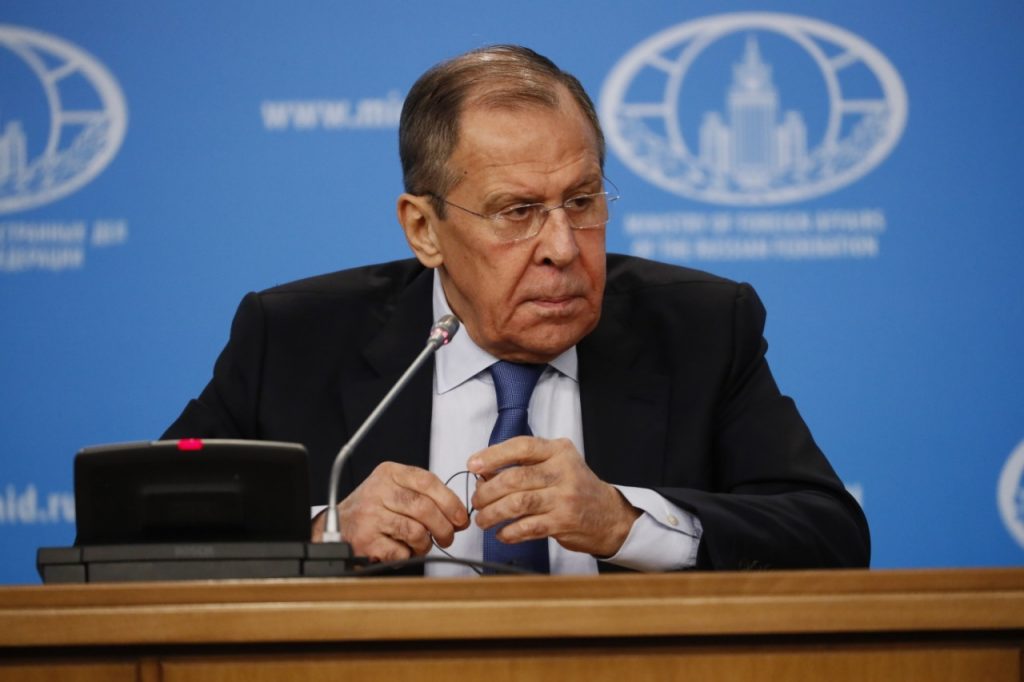
On Thursday, December 1, Russian Foreign Minister Sergei Lavrov held a press conference. On it, he made several high-profile statements. First of all, they concerned the West and Ukraine.
Key theses:
- “It is clear that if, and when, at some point in time, our Western neighbours – and there is no escape from the neighbourhood – our Western neighbours and former partners suddenly become interested in somehow restoring joint work on European security, then recovery will not work. Because restoration means what was before. But there will be no business as usual.”
- “Over the past few years, the OSCE Chairmen-in-Office have not been eager to break this negative trend. The Swedes were chairmen last year, and even then, they ceased to act as honest brokers but as active participants in Western politics in the OSCE. It was the Swedes who began to prepare the funeral of the OSCE. And our Polish neighbours have been diligently digging the grave for this organization all this year, destroying the remnants of the culture of consensus.”
- “They are already trying to build security without Russia and Belarus. But now they need to agree among themselves. Macron urgently flew to Washington to complain and demand. I don’t know how it will end. But we do not need such security. The whole security of Europe now comes down to its complete submission to the United States.”
- “We remember how NATO was created: when the first secretary general of the alliance, Mr Ismay, came up with the formula “Keep the Russians out of Europe, the Americans in Europe, and the Germans under control”. What is happening now absolutely means that NATO is returning to the conceptual priorities that were developed 70 years ago.”
- “NATO has claimed a claim to the Indo-Pacific region and Central Asia.”
- “Russia strikes at the infrastructure that helps to kill Russians.”
- “The Pope made a completely non-Christian statement about the supposedly aggressive two nationalities of the Russian Federation.”
- “Moscow did not ask for negotiations with Ukraine but is ready to listen to the other side.”
- “Those who came to power in Kyiv pose a real threat, and they need to be appeased, and the Russian Federation has said this before, but no one lifted a finger.”
Conclusions and outlooks:
In this case, it is essential to note the very factor of holding a press conference by the head of the Russian Foreign Ministry, which may indicate a significant shift in emphasis and a gradual return to active diplomacy at the geopolitical level. This is also evidenced by the regular publication of information on several negotiation formats at different levels (UAE, Ankara, Istanbul, Paris, etc.).
The main threat to Kyiv in this situation is Russia’s attempt to push through the format of negotiations on Ukraine without Ukraine itself. However, European states are gradually demonstrating their readiness for such a format.
At the same time, Lavrov once again focuses on the fact that Russia does not plan to return to the level of relations with the West which were maintained before the start of a full-scale invasion of the Russian occupation forces into the territory of Ukraine. Earlier, Putin has repeatedly stated that Russia will strengthen its position in Central Asia and strengthen relations with China, the Middle East and Africa.
Another message Lavrov is concerned with is the degradation and actual destruction of the OSCE, as well as the “illegal” (in his opinion) activation of NATO. This message boils down to the thesis already established in Russian propaganda about the complete elimination of the world order, which was established after the Second World War.
Commenting on the Ukrainian issue, Lavrov once again demonstrated that the Russian side does not consider Ukraine a subject state and prefers to talk with the “collective West.”
Lavrov’s press conference demonstrates the Russian side’s readiness to return to the negotiation process at the beginning of 2022, during which issues of the so-called “strategic stability” were discussed: the Russia-NATO and Russia-OSCE negotiations held in mid-January 2022. In this case, shortly, we can expect a reaction from the West, which will make it clear which position is acceptable for the US and Europe.
Introducing price ceiling on Russian oil.
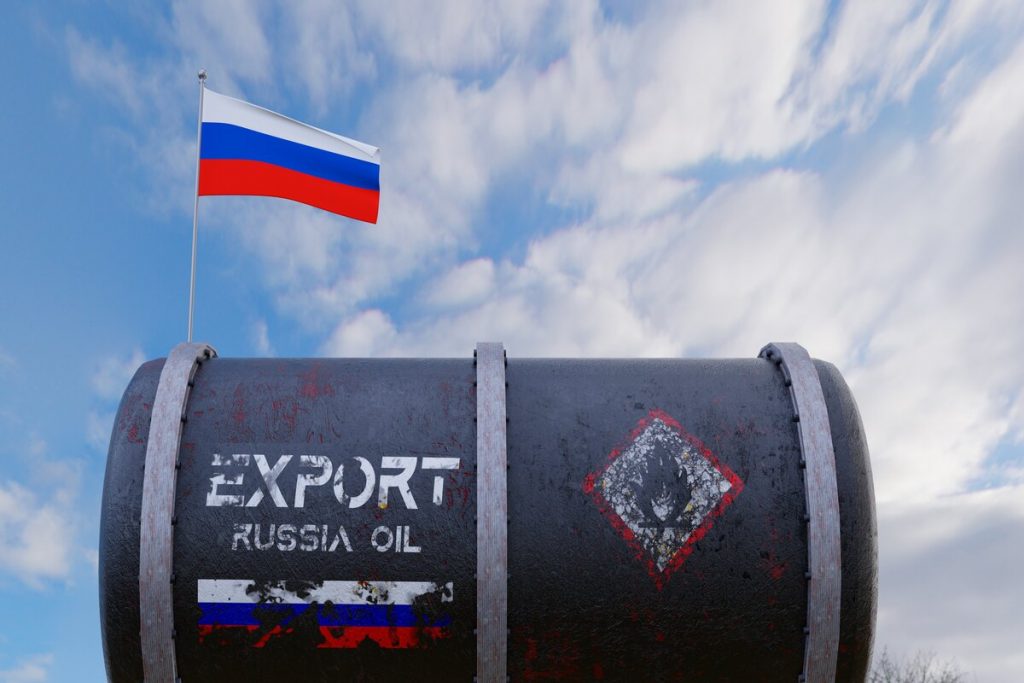
Throughout the week, the European Union, the G7 countries, and Australia continued discussions on determining the maximum price for exported Russian oil. Last week, such panels did not produce results. With a proposal of $65-70 per barrel agreed upon by the majority, Poland was the leading critic, saying it would not support an option higher than $30. At the same time, on December 3, the G7 countries and Australia reached a consensus. They set a limit at $60 per barrel, and the next day a similar decision was supported in the EU. In response to this decision, Moscow stated that the Russian Federation would not supply oil to countries that had introduced a price ceiling.
Timeline:
- On November 28, Bloomberg reported that EU representatives again failed to agree on a price ceiling for Russian oil. The $62 per barrel is being discussed, but Poland and the Baltic states still consider this price too high.
- Bloomberg reported that the next OPEC+ meeting would consider another cut in oil production.
- On December 1, The Wall Street Journal reported that the European Commission had proposed a cap on Russian oil prices of $60 per barrel.
- Reuters reported that the EU countries had previously agreed on a $60 price limit for oil from Russia.
- Deputy Treasury Secretary Adeyemo said that the price ceiling for Russian oil could be reviewed twice a month if necessary.
- On December 3, the G7 member states and Australia agreed to set a ceiling price for purchasing Russian oil supplied by the sea at $60 per barrel. The G7 countries also confirm their intention to phase out crude oil and petroleum products of Russian origin in domestic markets.
- Head of the Office of the President of Ukraine Andriy Yermak said that the ceiling should be twice as low: “It would be necessary to reduce it to $30 to destroy the enemy’s economy quickly.”
- Peskov confirmed that Russia would not accept a cap on Russian oil prices.
- On December 4, the European Union took the decision on the price ceiling and the embargo on Russian oil.
- Hungarian Foreign Minister Peter Szijjártó said that instead of a ceiling, “it is necessary to increase the number of energy sources because this will lead to lower prices.”
- Volodymyr Zelensky said that Russia would earn about $100 billion a year with the price ceiling set: “The logic is obvious: if the cap on the price of Russian oil is $60 instead of, for example, $30, which was mentioned, in particular, by Poland and the Baltic countries, then The Russian budget will receive about $100 billion a year.”
- The Hungarian authorities said that Budapest was exempted from the oil price cap.
- As a result of the meeting, the OPEC+ countries decided not to reduce oil production – at least for January 2023.
- Russian Energy Minister Novak confirmed the position that Russia will not supply oil to countries that have introduced a price ceiling.
Conclusions and outlooks:
In this case, the decision of the EU, G7 and Australia looks more like a compromise than a critical one for Russia. Urals oil is currently traded on the exchanges at $69 per barrel. Still, it is sold at a significant discount under bilateral contracts and corresponds approximately to the established “ceiling” level of $60. Thus, it can be assumed that the decision of the collective West was rather indicative, having no real impact on the situation.
Moreover, the US Treasury Secretary Adeyemo’s statement that the price ceiling for Russian oil can be reviewed twice a month, if necessary, raises several questions. First, subject to a sharp price jump, a revision can be carried out based on the results, of which Russia’s risks will be levelled.
No less important is the fact that the restrictions, like the earlier embargo, apply to oil transported by sea. Moreover, if the ships of the G7 countries have time to load with oil before December 5, they will not be subject to a price ceiling for the next 45 days. For example, the Druzhba oil pipeline remains without restrictions through which oil products are transported to Hungary and Poland. From the point of view of Hungary, this factor allowed Budapest to get an exception and buy Russian oil without price limits. In turn, Warsaw is seeking the imposition of anti-Russian sanctions on oil supplies via the Druzhba pipeline so that the country does not have to pay the penalty for the premature termination of contracts with the Russian side.
At the same time, many analysts view the introduction of a price ceiling through the prism of other agreements between the West and Russia. In this case, it is essential to trace not the statements of the Russian side but specific actions regarding oil supplies to those states that supported the price ceiling.
Also, analysts pay attention to the fact that the price ceiling primarily affects the interests of the European Union and, at the same time, provides additional privileges for the United States, increasing its supplies of petroleum products to the EU countries. This situation can significantly increase the political crisis between Washington and Brussels.

